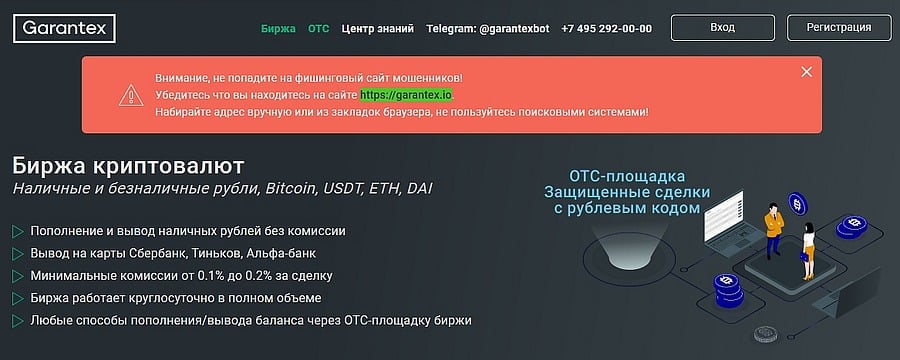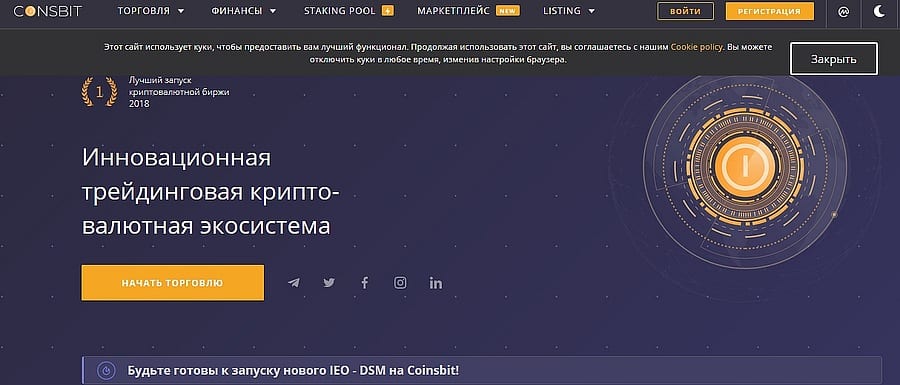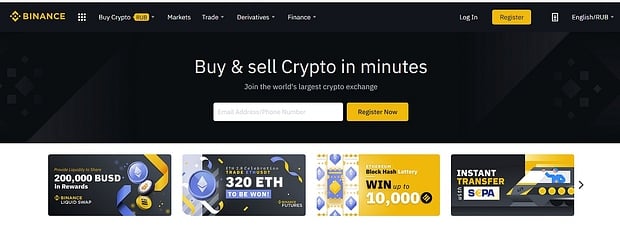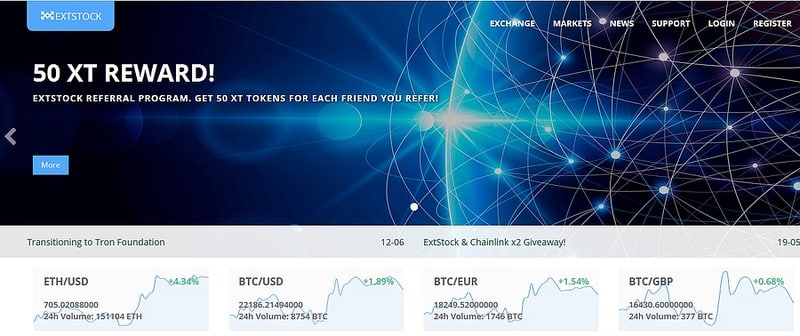Обеспечение безопасности криптотрейдинга или безопасных бирж не бывает
При торговле криптовалютами пользователь доверяет свои средства криптобиржам и обменникам. Даже если криптовалюта недолго находится на бирже, всё равно для пользователя очень важно обеспечить сохранность монет. В целом криптобиржи представляют однообразный, хорошо себя зарекомендовавший себя набор инструментов, но бывают и исключения.
Содержание страницы
Биржи и обменники
Binance ()
Binance одна из ключевых бирж криптовалютного рынка (как заработать на криптовалюте?). На бирже используется стандартный набор обеспечения безопасности клиента: затруднённая верификация и двухфакторная аутентификация (2FA) при регистрации учетной записи. Кроме того, веб-сайт бирже использует стандарт безопасности CryptoCurrency Security Standard (CCSS) для защиты учетных записей.
CEX.io ()
Одна из основных криптобирж, зарегистрированная Соединённых Штатах как Money Services Business (компания, занимающаяся денежными услугами), имеет лицензию Сети по борьбе с финансовыми преступлениями (FinCEN). Клиенты находятся под защитой второго уровня сертификата DSS, подтверждающего безопасность пользования банковскими картами. CEX строго следует стандартам обеспечения безопасности KYC/AML, то есть предупреждает возможность отмывания денег. Клиенты непосредственно защищены механизмами 2FA (СМС, Google Authenticator, мессенджеры), SSL-сертификатом, кошельками для холодного хранения криптовалют.
В отличие от многих бирж, неплохо работает система тикетов, которые прикреплены к отдельным разделам и стандартизированы. Биржа отслеживает запросы на сторонних ресурсах, но обработка писем и тикетов может занимать до недели. Также можно написать напрямую на электронный адрес support@cex.io. Представители биржи также отвечают на запросы клиенты через сторонние ресурсы. Обработка тикетов и писем в отдельных случаях занимает 3-4 дня, а иногда и неделю. Из плюсов – исчерпывающий FAQ с детальными инструкциями, а также регулярно обновляемый блог.
Garantex ()
Формально российская криптовалютная биржа, но головная компания зарегистрирована в Эстонии, работает с 2019 года с биткоином и тизер и рублями и гривнами. Пока трудно судить о её безопасности, но двухфакторная аутентификация (Google Authentificator) – есть.
EXMO ()
Один из гигантов криптоиндустрии, но не считается безопасной. Клиенты нередко обнаруживали, что кто-то проводил сделки на их счетах, биржа известна нестабильным вводом и выводом. Некоторые улучшения произошли на бирже после 2018 года. Была налажена работа тикетов поддержки, которая стала отвечать не позднее, чем в течение 15 минут. Представители EXMO работают на крупных ресурсах по крипте и отслеживают критику клиентов.
На бирже есть такие инструменты как настройка доступа к аккаунту с доверенных IP-адресов, двухфакторная аутентификация, подтверждение снятия средств через электронный адрес, история торговых сессий. Это несколько больше стандартатного набора криптобирж. На бирже сообщают правила безопасного поведения клиента, предупреждая, что защитить аккаунт от взлома можно установив 2FA и на почту регистрации на EXMO. Рекомендуется использовать сложный, уникальный пароль, который рекомендуется регулярно менять и не сохранять в браузере
Предлагается также ряд очень уместных советов для каждого криптоэнтузиаста: проверять адресную строку браузера криптобиржи, не предоставлять персональные данные по запросам в Telegram и других мессенджерах, не откликаться на требования предоставления доступа к средствам, электронной почты, паролей и каких-либо подробностей об аккаунте. EXMO предлагает следующий алгоритм в случае подозрения на взлом аккаунта или почты пользователя: немедленно сообщить о подозрениях в службу поддержки EXMO в котором указать причину обращения, имя пользователя (логин) на бирже EXMO, адрес электронной почты, на который зарегистрирован аккаунт, в теле письма напомнить, что проблема – во взломе почты. В настройках безопасности также есть возможность подключить «Доверенные IP», то есть такие IP адреса, с которых будет возможна работа на бирже, — а с любых других не будет возможна.
Bybit ()
Биржа позиционируется как очень безопасная, например, деньги клиентов хранятся в системе иерархически детерминированных офлайн-кошельков (вне сети), сбор и снятие средств осуществляются с помощью офлайн-подписей. При переводе средств из кошельков биржа использует мультисигнатурные схемы адресов, то есть использует больше одного ключа.
Во избежание онлайн-слежки и фишинговых атак, веб-сайт ByBit использует полное SSL-шифрование, то есть шифруются все отправляемые на биржу пароли и адреса. Для обеспечения рисков, связанных с возможностью возникновения недостачи в расчётах по фьючерсным контрактам, ByBit предлагает страховой фонд, который задействуется если позиция трейдера ниже цены банкротства. При регистрации предлагается стандартная двухфакторная аутентификация.
Deribit ()
Deribit, в отличие от многих бирж, ни разу не пострадала от действий хакеров, что показывает её достаточную защищённость. По собственным данным криптобиржи, 95% средств пользователей хранятся на кошельках, вынесенных из системы. Любопытной особенностью биржи является то, что она привлекает белых хакеров, для проверки уязвимости биржи, приложений, обновлений и так далее. Биржа утверждает, что постоянно и регулярно проводит аудит, закрывает мусорные счета с недостаточным финансированием. Биржа располагает механизмом контроля рисков для работ с деривативами. Индивидуальная безопасность обеспечивается через SSL-соединение, двухфакторной аутентификацией, закреплённым IP-адресом, таймингом сеанса.
Coinsbit ()
Coinsbit обладает достаточно высоким уровнем защиты, её не взламывали, сертификат безопасности получен от компании HackControl. Биржа защищена от ботов, DDoS-атак, имеет высокий уровень шифрования данных, средства пользователей хранятся в основном в холодных кошельках. Тем не менее на многих интернет-ресурсах для трейдеров или холдеров отмечается как скам и сомнительное мероприятие.
Currency ()
«Биржа токенизированных активов», Currency. Безопасность биржи основана на уровне GDPR в EC. Данные хранятся на серверах дата-центра LD4 под контролем Equinix, следует требваниям FATF и Наблюдательного совета Парка высоких технологий Беларуси по борьбе с отмыванием денег. Биржа поддерживает фильтрацию по IP-адресам, двухфакторную аутентификацию (2FA), API-ключи, защиту депозита/вывода средств по стандартам PCI DSS, пользовательские данные хранятся с криптографическими алгоритмами AES-GCM-256. Основной объём средств хранится в холодном распределенном хранилище, около 5% активов – на горячих кошельках, для обеспечения внутридневного трейдинга. На бирже также внедрён механизм проверки блокчейн-транзакций и защиты средств пользователя от хакерских атак.
Livecoin ()
Известная биржа, входит в число наиболее популярных. Индивидуальная безопасность обеспечивается двухфакторной аутентификацией, транзакции должны подтверждаться пин-кодом. Среди других средств безопасности — регулировка продолжительности торговой сессии, создание списка разрешенных IP; можно настроить уникальное приветствие, которое невозможно подделать в случае фишингового копирования; своеобразная система верификации; индивидуально настраиваемые уведомления по емэйлу.
Kraken ()
Кракен – старейшая криптобиржа и первая, прошедшая полный криптографический аудит, подтвердивший её полную защищённость. На бирже не только при регистрации, но и при начале торговли используется двухфакторная аутентификация. Преимуществом биржи, повышающим уровень безопасности пользователя (а не биржи и не регулятора) является возможность не рассекречивать личные данные, по крайней мере, сразу. Но при этом верификация многоступенчатая и сложная. Впрочем, эта биржа предназначена для профессионалов индустрии, так что все её особенности исходят из того, что пользователи не рядовые энтузиасты.
Binance ()
Binance один из ведущих игроков криптовалютной индустрии. У криптобиржи есть интересная памятка для клиентов, с которой нелишне будет ознакомиться любому криптоэнтузиасту. В ней, в частности, рекомендуется не хвастаться об успешных операциях, не рассказывать даже о тех адресах, которые были использованы ранее, соблюдать осторожность при упоминании баланса, не распространять информацию об автономной идентификации, пользоваться зашифрованными каналами связи. Также биржа предупреждает, что злоумышленниками могут быть родственники и знакомые.
Бинанс поддерживает необходимость трейдеров знакомится с современными методами мошенничеств. И, конечно, настоятельно рекомендует использовать надежный и уникальный пароль и 2FA для вашей учетной записи. Пользователям рекомендуется хранить приватные ключи в автономном режиме и не хранить все деньги на биржевом счёте.
В заключении пользователям напоминают, что безопасность никогда не бывает абсолютной и совершенной и нужно пополнять знания и знать о своих потенциально слабых местах. Интересно, что при всей убедительности верификация на бирже не обязательна, если не предполагается оперировать большим объёмом депозитов. В конечном счёте криптобиржа не является образцом безопасности, в 2019 она была взломана несмотря на все усилия по обеспечению безопасности.
Bittrex ()
Это одна из самых больших, популярных и функционыльных криптобирж. Позиционируется как биржа с высокой степенью обеспечения сохранности средств трейдеров. При этом механизм верификации сложный и не до конца проработанный, а техподдержку нельзя назвать лидером по отзывчивости. Кроме того, биржу взламывали и пострадали клиенты, которые не прошли двухфакторную аутентификацию. Сейчас аутентификация через Google Authenticator обязательно для обеспечения максимального лимита на вывод средств. Биржа трудоёмко защищена от DDOS, — нужно часто подтверждать, что клиент человек.
Coinbase ()
Биржа, которая стабильно входит в разные рейтинг по объёмам оборота. Позиционируется как очень безопасная биржа, имеет довольно престижную лицензию NY в рамках программы BitLicense, что значит, что биржа полностью соответствует KYC и развивается в строгом соответствии с нормами регуляторов. Но также это означает, что ни о какой анонимности на бирже и речи быть не может. Активы Coinbase застрахованы, то есть теоретически даже успешная кража не обязательно станет трагедией для пострадавшего. При верификации, а иногда и для того, чтобы покупать и продавать, нужно предоставлять удостоверение личности.
Poloniex ()
Позиционируется как «Легендарная биржа криптоактивов», имеется в виду, вероятно, что одна из самых старых криптобирж. Биржа имеет положительную репутацию, предлагает большой выбор криптовалют и функциональных возможностей. Полностью безопасной её назвать нельзя, вопросы по безопасности к бирже были с самого начала её существования. Биржа вскрытая, но быстро реагирует на вторжения, так, потери пользователей в результате хакерской атаки были компенсированы. Но это было 6 лет назад и с тех пор повторных удачных атак не было. Но зато ещё два года назад работало фишинговое приложение, которое воровало данные клиентов с биржи, причем приложение было выложено в открытом доступе. В 2019 году была масштабная утечка данных с биржи. Криптобиржа предлагает стандартный набор средств безопасности, но насколько она защищена – вопрос спорный.
ОКЕх ()
ОКЕх один из ключевых игроков криптоиндустрии. Также нельзя утверждать, что криптобиржа ОКЕх образец безопасности, совсем недавно, в октябре, биржа остановила вывод всех активов, причем объяснила это тем, что один держатель ключей недоступен и сотрудничает с бюро общественной безопасности в рамках расследования. Что это было такое, никто так и не понял, но этот случай хорошо показывает, что никакая, даже биржа, которая позиционируется как «самая надёжная биржа» таковой не является Держать все или даже преобладающую часть средств на криптобирже категорически нельзя. На ОКЕх возможна торговля только верифицированными пользователями, причем уровень верификации повышается для вывода всё больших сумм. Но, в целом, основа всё та же, — проверка документов и Google Authenticator.
ExtStock ()
Набирающая популярность криптобиржа, о которой мало информации. Известно, что летом биржа подозревалась в экзоскаминге и завышении реальных объемов торгов, на подозрения никак не ответила. Для безопасности клиентов криптобиржа предлагает двухфакторную аутентификацию и верификацию аккаунтов.
Overbit ()
Биржа двухгодичного возраста, безопасность обеспечивается двухфакторной аутентификацией и обязательной верификацией на вывод средств. Есть также возможность смены пароля. Пользователи сообщают о проблемах с двухфакторной аутентификацией, которая работает нестабильно. Плюсом для безопасности является то, что биржа разработана одной командной, без привлечения сторонних компаний, что повышает уровень сохранности информации.
BitForex ()
Биржа обеспечивает хранение практически 98% средств на холодных кошельках, в горячих кошельках находятся средства на вывод. Имеет защиту от DDOS. Плюс биржи в том, что недавно был практически заново пересобран сервер данных. Клиентам предлагается двухфакторная аутентификация и верификация аккаунта и верификация на вывод средств (торговый пароль).
Hotbit ()
Несмотря на то, что Хотбит уже довольно известная, на многих ресурсах предупреждают, чтоб криптобиржа сомнительная по своей сути. Работа с ней в таком контексте – на страх и риск пользователя. Что касается безопасности, то на бирже отсутствует верификация, что, с одной стороны облегчает работу биржи, но с другой немного настораживает. На бирже есть двухфакторная аутентификация Google, работает на бирже довольно нестабильно. Непосредственно безопасность трейдинга на бирже обеспечивается к GSLB, распределенными серверными кластерами, распределенным хранилище и высокоскоростной системой памяти и так далее.
Paritex (paritex.com)
Существующая всего один год криптобиржа занимает уже топ-места в индустрии. Пока биржа не успела прославиться чем-то выдающимся. Клиенты защищены на платформе стандартно – верификация, аутентификация.
BIT.TEAM ()
Довольно крупная криптобиржа, на которой клиент защищён паролем, торговым паролем, двухфакторной идентификацией и Anti-Phishing кодом. Двухфакторный пароль и торговый пароль нужен для вывода средств с биржи. Также клиентам предлагается хранение на холодном кошельке и мульти-подпись DKKT. Архитектура безопасности выстроена на основе нескольких кластеров, биржа сотрудничает с международным оператором риск-менеджмента Knownsec, международной командой по управлению высоким риском.
Coinmama ()
Функционирует уже семь лет, может считаться почти ветераном индустрии. Но это не совсем биржа, а только сервис для покупки криптовалюты. В отличие от подавляющего большинства бирж, не имеет двухфакторной аутентификации, основа безопасности – сложный пароль. С другой стороны, это оправданная экономия, так как на платформе не хранятся деньги, — клиенты сразу рассылают их по своим адресам.
Cryptology ()
Крайне упрощённый формат криптобиржи о достаточной безопасности которой трудно что-либо сказать. Некоторые платформы прямо предупреждают, что эта биржа небезопасна и вообще сомнительное мероприятие. Регистрация на бирже очень простая, верификация не требуется, что значит, что на бирже можно торговать анонимно, кого-то это обрадует.
PrimeXBT ()
Отличается от большинства современных криптобирж тем, что не практикует принудительные процедуры KYC, то есть не нужно отсылать на проверку паспорт и другие документы. Но двухфакторная аутентификация есть и два кошелька – горячий и холодный, средства хранятся в холодном кошельке, горячий используется только для трейдинга. Также биржа ведёт белый список криптоадресов, который заполняют клиенты.
Coinegg ()
Биржа, работающая с 2013 года, но известная намного меньше, чем намного более молодые криптобиржи. Уровень безопасности стандартный, — аутентификация Google, стандартов KYC-AML, невозможность транзакций без повышения уровня безопасности, торговый пароль на операции.
Bitpapa ()
Криптобиржа-маркетплейс в формате обмена криптовалютами между людьми. Защищён 2FA аутентификацией, антифишинговым словом, верификация стандартной сложности.
Bibox ()
Децентрализованная криптобиржа, основа безопасности – различные пароли, но также предлагает двухфакторную и СМС-аутентификацию (нужно уточнять, кому в данный момент доступна СМС-верификация). Дополнительно биржа представляет пароль на ввод и вывод средств, антифишинговый код. Следует обратить внимание, что биржа не представляет лицензию регулирующих органов, это не плюс в плане безопасности.
Bit2Me ()
Сервис покупки биткоинов посредством банковских карт, не самый известный криптосервис. В соответствии с функционалом, сервис не имеет горячих кошельков, только холодные. На сайте обязательная верификация, что входит в противоречие с невнятным правовым статусом сервиса. Назвать его безопасным для клиентов будет не совсем правильно.
CoinCola ()
Не самый известный криптосервис, но у него есть свои сторонники. Несмотря на то, что это криптобиржа, но на сайте есть возможность хранить средства только на холодных кошельках. Верификация на бирже не обязательная, но нужна если вывод от 1 тыс. долларов, то придётся её пройти.
Bibox ()
Децентрализованная биржа, которая работает с помощью искусственного интеллекта, хотя неизвестно, как именно помогает работае искусственный интеллект, так как в целом биржа обычная, со стандартным функционалом. Верификация на бирже не обязательна, но желательна, если есть планы проводить крупные транзакции.
OKCoin ()
Относительно небольшая биржа по современным меркам, некогда одна из самых больших. Клиентские аккаунты защищены СМС-верификацией или как альтернатива — двухфакторная аутентификация не только через Google, но и через WeChat, Google. Также есть антифишинговый код и пользовательский пароль для трейдинговых операций. Возможно, из-за того, что биржа довольно старая, есть проблемы с СМС-верификацией и зарегистрированы факты несанкционированного входа в чужие аккаунты.
LakeBTC ()
Это обменник и холодный кошелёк для хранения средств клиентов, довольно популярная одно время в Азии. Если предполагается торговать чем-то кроме криптовалюты, то нужно пройти верификацию. Клиенты защищены двухфакторной верификацией. Биржа обладает довольно слабой защитой от DDOS и периодически подвергается атакам, но несмотря на это, до сих пор не была взломана, в отличие от многих более продвинутых бирж.
BitBay ()
Биржа работает с 2014 года, довольно популярная до сих пор. BitBay использует сквозные зашифрованные соединения SSL, полное резервирование паролей и данных с полным шифрованием. Платформа также гарантирует сохранность информации пользователя с полным резервным копированием данных и паролей в зашифрованном виде. Средства клиентов хранятся на холодных кошельках, биржа предлагает 2F аутентификацию.
Bitmart ()
Биржа, которая работает с 2018 года, при этом имеет настоящую лицензию на осуществление финансовой деятельности в международном масштабе. Для безопасности применяется двухфакторная аутентификация и код для торговых операций. Но их можно не подключать, если планируется торговать суммами эквивалентом менее двух биткоинов. Есть защита от ботов и DDOS, средства хранятся на холодных кошельках, горячие кошельки только для торговых операций.
Правила безопасности
Ни одна криптобиржа не обеспечивает полной безопасности клиентов. Практически все биржи уверяют, что пользуются передовыми методами защиты, но особенно доверять этим утверждениям не стоит, трейдер или холдер должны сами озаботиться безопасностью своих монет. Основы безопасности пользования криптовалютами базируется, по сути, на двух основных принципах – выбор кошелька и бдительность (стратегии торговли криптовалютами).
Для хранения криптовалют уже давно не годятся горячие кошельки, так как они очень уязвимы перед современными хакерами. Поэтому средства нужно хранить только в холодных, офлайн-кошельках, выводя средства из них на горячие кошельки только непосредственно перед торговой сессией. Сложность пользования холодными кошельками в том, что можно потерять кодовое слово и пароль, и это происходит регулярно. И означает полную потерю средств. Поэтому нужно записывать пароли, но хранить их так, чтобы никто не могут увидеть. Что касается бдительности, то активно торгуя на бирже или имея значительный запас криптовалюты, не нужно распространять об этом абсолютно никакую информацию об этом ни офлайн, ни онлайн, в том числе среди знакомых. Кстати, с недавних пор развивается такое направление, как страхование криптовалют. Его предлагают как сами биржи, так и некоторые криптобиржи.




